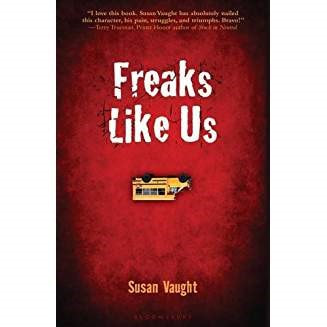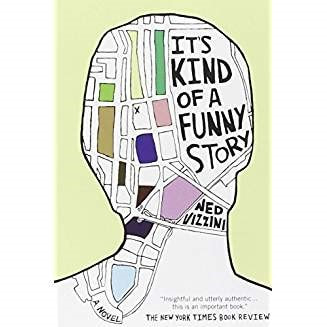Since I started my career as a professor over sixteen years ago, I have included young adult literature featuring characters with mental illness in my humanities and English Education courses (see “Using Literature to Confront the Stigma of Mental Illness”). I bring in YA lit because books written specifically for teenagers offer our future educators insights that are not always accessible through reflections on their own schooling, textbooks by experts on pedagogy, or field experiences at local schools.
This year while on sabbatical, I am completing research for a book forthcoming from ABC-Clio/Greenwood Press (Mental Illness in Young Adult Literature: Exploring Real Struggles through Fictional Characters). While reading selected YA novels purchased with a research grant from Northern Michigan University, I have reflected on many of the benefits of including books about mental illness in high school and college classrooms. Here, I will highlight two issues:
- YA lit can demonstrate how our language signifies our beliefs
- YA lit can showcase authentic symptoms of mental illness
Language
insane, apeshit, crazy, nuts, weird, lunatic, depressed, psychotic, anxious, delusional, sick, freaks, impaired, alphabets, fucked up, mental patients, screwed up.
A few of these (such as anxious or depressed) are authentic terms for mental illness as identified by the Diagnostic and Statistical Manual of Mental Disorders (5th ed., APA, 2013). However, the majority of the terms are slang – mostly negative labels or insults, and whether used by the character with the mental illness or someone else, the results are typically the same: isolation, disapproval, or (self-) doubt.
In Labeling people as ‘The mentally ill’ increases stigma, Darcy Haag Granello, a professor of counselor education at The Ohio State University, describes a study on the use of terms such as “mentally ill” and “persons with mental illness” and confirms that words influence our attitudes, which guide behaviors. Likewise, researchers in London (Diana Rose, Graham Thornicroft, Vanessa Pinfold, and Aliya Kassam) have identified 250 different labels used to stigmatize individuals with mental illness. Their study highlights that young people have a lack of factual information about mental illness and points to media, family, and peers as sources for the derogatory terms learned.
Educators and others who work with adolescents should talk about the vocabulary used in YA novels and discuss how negative terms can influence beliefs and behaviors and perpetuate stigma. Doing so could help to counteract the abundance of the pejorative terms used in the media and elsewhere, and perhaps could change how individuals with mental illnesses are treated by themselves and others in their lives.
Authentic Symptoms
For example, in a series of email exchanges with her friend Connor, eighteen-year-old Isabel (narrator of Amy Reed’s novel Crazy) vividly describes her symptoms of bipolar disorder. Over a seven-month period, Izzy takes readers through alternating moods of mania and depression. Reed’s portrayals reflect many of the symptoms common with bipolar disorder such as:
- depressed mood
- feelings of worthlessness
- feelings of grandiosity
- sleeplessness
- bursts of talkative energy
- impulsivity
- increased irritability
- intense goal-directed activities
- extreme involvement activities with potential for negative results.
In one of her manic states, we can see Isabel’s increased energy. She says she is on a “different frequency” and rambles that “space and time have spikes and gravity shifts around one moment you’re flying and the next you’re a pancake on the highway and the cars are running over you one after another after another and it doesn’t hurt.” When she is in a depressed state, Izzy feels worthless: “I am a parasite on this world. I suck the life out of the things I love…Somebody shoot me. Somebody put me out of my misery.” Thanks to these kinds of descriptions, and Connor’s responses to them, readers get a better understanding of bipolar disorder.
In Neal Shusterman’s award-winning novel Challenger Deep, fifteen-year-old Caden Bosch exhibits symptoms of schizophrenia that align well with the DSM-5’s list for that disorder, which can include:
- racing or jumbled thoughts
- a pressing need to pace or walk around
- auditory and visual hallucinations
- paranoia.
Caden thinks another student at school is trying to kill him, and believes that “hissing sprinklers” are actually snakes in disguise. He believes he is on board a large ship headed for the Marianas Trench, sailing with a captain (with an eye patch) whose parrot has “an eye patch and a security badge.” Because he has difficulty differentiating between reality and fantasy, Caden’s descriptions of his symptoms –and his journey - take on multiple meanings. Shusterman tells readers that the story is not a work of fiction because the “places that Caden goes are all too real.” The author’s own son experienced mental illness, and Shusterman tried in the novel to “capture the descent” into “the deep.” His goal for the book is to help individuals with mental illness feel less alone and to help others to develop empathy for those who “sail the dark, unpredictable waters of mental illness.”
Jessie Hatcher, the fifteen-year-old narrator of Motorcycles, Sushi, and One Strange Book, authored by Nancy Rue, consistently displays realistic symptoms of inattention and hyperactivity-impulsivity, both of which are associated with Attention-Deficit/Hyperactivity Disorder (ADHD). She has difficulty concentrating and describes her mind as running nonstop like a hamster on a wheel. Additionally Jessie has trouble:
- being forgetful and disorganized
- appearing not to listen when spoken to directly
- being easily distracted
- blurting out answers before questions are completed.
All three young adult characters described above – Izzy, Caden, and Jessie, receive treatments such as medication, therapy, and/or hospitalization for their mental illnesses after being diagnosed by medical professionals. Readers, especially young adults, should be cautioned not to try to diagnose themselves, their friends, or relatives by using lists of symptoms in novels or elsewhere. Likewise, teachers and other adults should not assume that the symptoms shared by teens in YA novels are consistent across all youth; like all illnesses, symptoms vary from individual to individual. All readers, however, can turn to YA literature texts such as these to learn more about those who have mental illnesses.
Final Thoughts
Bringing in books about mental illness to high school classrooms means that issues such as depression, schizophrenia, bipolar disorder, and ADHD will be discussed. Teachers might feel unqualified to handle such discussions. However, in an Education Week article in 2014, Thomas J. Cottle and Jennifer Greif Green say that teachers don’t have to become “experts in diagnosis or treatment” nor do they need to “assume the role of therapist or counselor.”
Talking about characters with mental illnesses is not a new concept - think of the suicides in Romeo and Juliet, depression in Hamlet, and PTSD in The Things They Carried. We are already doing some of this kind of work. Great articles on young adult literature – including articles related to psychological issues and mental illness – can be found in The ALAN Review, Study and Scrutiny, and the Journal of Adolescent and Adult Literacy, as well as in NCTE journals such as English Journal, Voices from the Middle, and English Leadership Quarterly. Additionally, a 2016 book by Dean A. Haycock, Characters on the Couch: Exploring Psychology through Literature and Film, offers insight into 100 well-known fictional characters from books and films.
By doing a bit of research and being willing to have the conversations (being brave, as Falter recommends), educators and others invested in helping youth can challenge the stigma associated with mental illness.
For additional resources, visit these web sites:
http://stopthestigma.org/
http://www.bringchange2mind.org/
https://www.nami.org/Find-Support/Teens-and-Young-Adults
https://www.jedfoundation.org/
http://youth.gov/youth-topics/youth-mental-health
| Dr. Kia Jane Richmond, professor of English at Northern Michigan University, directs the English Education program and supervises student teachers in Michigan and Wisconsin. Her publications have appeared in English Education, Teaching English in the Two-Year College, Language Arts Journal of Michigan, Composition Studies, Issues in Writing, and Journal of the Assembly for Expanded Perspectives on Learning. This fall, she and coauthor Elsie L. Olan will receive the 2017 CEL English Leadership Quarterly Best Article Award for “Conversations, Connections, and Culturally Responsive Teaching: Young Adult Literature in the English Methods Class.” |









 RSS Feed
RSS Feed